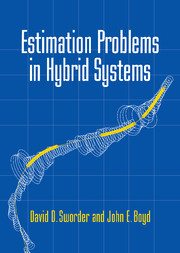Book contents
- Frontmatter
- Contents
- List of Illustrations
- Preface
- 1 Hybrid Estimation
- 2 The Polymorphic Estimator
- 3 Situation Assessment
- 4 Image-Enhanced Target Tracking
- 5 Hybrid Plants with Base-State Discontinuities
- 6 Mode-Dependent Observations
- 7 Control of Hybrid Systems
- 8 Target Recognition and Prediction
- 9 Hybrid Estimation Using Measure Changes
- Appendix 1 PME Derivation Details
- Appendix 2 COM Derivation Details
- Bibliography
- Index
- Glossary
1 - Hybrid Estimation
Published online by Cambridge University Press: 17 August 2009
- Frontmatter
- Contents
- List of Illustrations
- Preface
- 1 Hybrid Estimation
- 2 The Polymorphic Estimator
- 3 Situation Assessment
- 4 Image-Enhanced Target Tracking
- 5 Hybrid Plants with Base-State Discontinuities
- 6 Mode-Dependent Observations
- 7 Control of Hybrid Systems
- 8 Target Recognition and Prediction
- 9 Hybrid Estimation Using Measure Changes
- Appendix 1 PME Derivation Details
- Appendix 2 COM Derivation Details
- Bibliography
- Index
- Glossary
Summary
Introduction
Common problems in design require that an engineer devise a control or decision algorithm that converts measurements of system and environmental variables into signals that aid in system regulation. For example, a control node converts sensor outputs into an actuating signal that moves the system toward the desired operating point and keeps it there. At this foundational level, the engineer must formulate a mapping from the system observables into an action or report; for example, a feedback regulator converts the measured outputs of the system to be controlled (the plant) into an input that stabilizes the system.
Design is made difficult by disturbances internal to the system and by noise at its output. For example, there may be no sensors that measure those plant variables most useful for regulation, or, if measured, the variables may be masked by noise in the sensor-to-regulator link. Lacking omniscience, an engineer must process the available measurements to produce a good approximation to relevant but “hidden” variables. And this inference must be done on-line. The processing algorithm must not only be adapted to the incoming data stream, it must be of a form that can be implemented: An implementable estimation algorithm is an explicit mapping of the sensor output process (the measurements) into a (nearly) concurrent estimate of the required variables. In the applications studied here, the need for contemporaneous response limits consideration to finite-dimensional recursive algorithms; new observations are integrated into an estimate in an accretive manner.
- Type
- Chapter
- Information
- Estimation Problems in Hybrid Systems , pp. 1 - 40Publisher: Cambridge University PressPrint publication year: 1999



